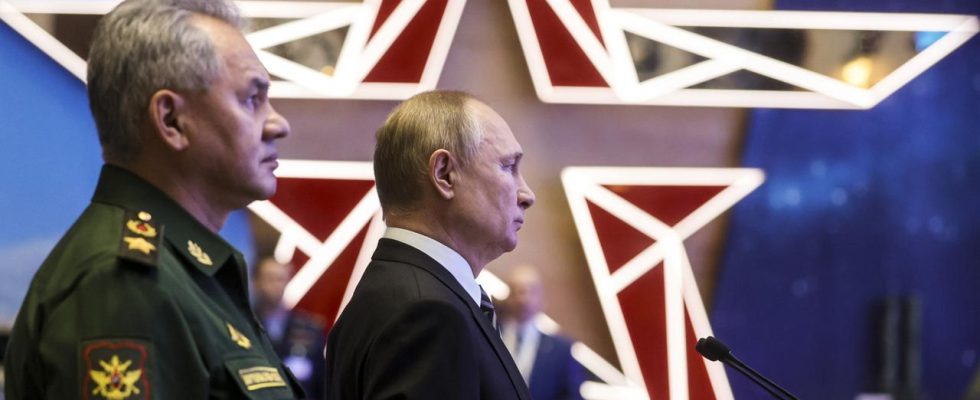It is a dispute that is unusually open for Russia: the Wagner troupe is supposed to submit to the Russian Ministry of Defense, but refuses. Is there a power struggle raging here – or does the conflict ultimately serve Putin?
Obscene curses, savage curses – again and again the founder and head of the Wagner troupe, Yevgeny Prigozhin, publicly attacks the defense minister and the chief of staff of the Russian armed forces. He holds them personally responsible for the sluggish progress of the so-called “military special operation,” which he simply calls war – contrary to the official terminology.
Prigozhin blames them for the defeats, for the high losses: “Their inability is costing the lives of tens of thousands of Russian boys. That is unforgivable,” he says.
Prigozhin berates officials as “perfumed chair farts” and warns the elites of the revenge of the people who make sacrifices at the front while sipping morel soup. He attacks the system. And still remains untouched.
There is no procedure for creating and financing a private army, which is banned in Russia. There is also no trial for repeatedly discrediting the army, insulting officials or violating censorship laws.
A long acquaintance
Different rules obviously apply to Prigozhin, probably also because he enjoys the favor of the president. Vladimir Putin and he have known each other for a long time – from Petersburg times, when Prigozhin began his career as a businessman after serving a prison sentence.
He opened restaurants, became the Kremlin’s caterer and was given the nickname “Putin’s chef”, which he considered inappropriate. After all, Prigozhin said in an interview with the patriotic journalist and self-proclaimed political adviser Konstantin Dolgov, he never cooked and he can’t either:
You should have nicknamed me ‘Putin’s Butcher’ right away. That would have been better.
He says it without any irony. In fact, the combat unit Wagner, which he founded, has fought more than one bloody battle in the interests of the Kremlin: in countries where there were officially no Russian operations.
A role that he now openly accepts: Prigozchin as the leader of the fighters in his Wagner troupe.
Knowledge that should protect
Even if Prigozhin now openly admits to some of these missions, which have been kept secret for many years, he should know enough details to guarantee him a certain level of protection from the very top.
Much has been clarified personally, said investigative journalist Ruslan Leviev from the Conflict Intelligence Team back in 2019: “Apparently there is direct contact between Putin and Prigozhin. Sometimes without any involvement from Shoigu. Shoigu and Prigozhin don’t get along.”
A whole bunch of allegations
Accusations by Prigozhin and former fighters that the Ministry of Defense adorns itself with successes that the Wagner troops had bloodily achieved have not only been raised since the beginning of the war against Ukraine. That the troops, which have a reputation for acting mercilessly and brutally, were not equipped with sufficient ammunition and modern technology. And that bureaucratic mistakes would have led to high losses.
It is primarily about recognition and strategic issues. Ultimately, it is also about power and influence.
Essential fighters
Prigozhin has set up a parallel military structure in Russia, and the regular armed forces can hardly do without the Wagner troop fighters at the moment, even though the Ministry of Defense has no direct access to them.
This explains the somewhat desperate attempt to enforce a contractual subordination and classification of all so-called voluntary associations by July 1st.
Should Prigozhin refuse to sign, as announced, this would have serious consequences for the ministry, says political scientist Michel Naki on his YouTube channel. Then it would be clear to everyone in Russia “that the Ministry of Defense does not control the Wagner Group and cannot do anything against it.”
Fragile balance between security devices
It would be a demonstration of power by Prigozhin that could massively upset the fragile balance between the various security apparatuses in Russia.
A situation that seems delicate for the regime, but which could still play into Putin’s hands. Nine months before the presidential election, a successful intervention would underline once again that he is indispensable as a mediator and anchor of stability.
So is it a set-up, a little out of control game? Or has Prigozhin long since had its own agenda?
Prigozhin’s political credo
Whether he wants to position himself politically or whether his primary concern is to strengthen his role in the system so that he can continue to pursue his lucrative business undisturbed, no matter what happens, remains open for the time being.
In an interview with the journalist Dolgow, he sums up his political creed as follows:
i love my homeland I obey Putin. Schoigu has to go. We will keep fighting.
Critical statement on war aims
Prigozhin is surprisingly critical of Putin’s war goals. Instead of demilitarization, the opposite has been achieved in Ukraine.
The war made the Ukrainian army one of the strongest in the world – with a morale, he says appreciatively, that is in no way inferior to that of the Soviets in World War II.

